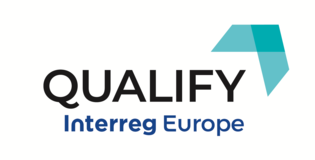Between 29. 6. and 1. 7. 2021, Qualify project partners meeting took place in Slovenia.
DAY 1
On the first day, 29. 6., we welcomed Qualify project partners at CCIS. Firstly, we presented Chamber of Commerce and Industry of Slovenia - Chamber of Agricultural and Food Enterprises and our work in the field of food fraud, food safety and other topics. Later on, representative from Administration for Food Safety, Veterinary Sector and Plant Protection (AFSVSPP) presented their organizational structure, implementation of official controls, control tasks to verify compliance by the operators, documentary procedures, CIS - Central Information System, procedural acts, general annual plan, most common food fraud cases in Slovenia etc. At the end of the meeting, extensive discussion about practices regarding official controls in Slovenia and other project partners countries followed.
Afternoon study visits:
After lunch, we went to Medex, that is a food company, that produces honey, honey products and dietary supplements. They guided us through their production and explained how they analyse their raw materials, to provide safe and authentic final products.
Since the Jožef Stefan Institute is the leading Slovenian scientific research institute, covering a broad spectrum of basic and applied research, that was our next stop. One of the areas, they cover is also food fraud. Their ERA Chair for isotope techniques in food quality, safety, and traceability, was established in Summer 2014. ISO-FOOD enables the fusion of multidisciplinary knowledge and ideas for target-oriented research on three Pillar themes (Food authenticity, Food traceability and Food Safety) and two Horizontal themes (Metrological support and Knowledge repository). Representatives from Laboratory of colloid biology and Department of Low and Medium Energy Physics also presented their work, in connection with food safety. At the end of the meeting, we had the opportunity to see their laboratories and devices for performing different analyses in live.
DAY 2
Study visits:
On the second day, 30. 6., we went to Primorska. Our first destination was National Institute of Biology, Marine Biology Station Piran. Their mission is to combine scientific work and applicative solution to better understand the marine ecosystems. They regularly collect Oceanographic data, by performing various measurements through Oceanographic buoy, High Frequency radar (HF Radar) and from samples, collected at sampling stations. Regarding food fraud, a study about substitution of species between squid on the Slovenian market, that has been made, was presented to us.
After the tour around Port of Koper, representatives from Financial Administration of the Republic of Slovenia (FARS) and AFSVSPP presented their work in Port of Koper. Regarding Import of Food of Non-Animal Origin, FURS performs documentary & identification checks, AFSVSPP performs physical checks and annual sampling plan for import.
Primorska is the warmest wine-growing region in Slovenia, and the most popular among wine lovers. That is one of the reasons, we visited VinaKoper. They guided us through their wine cellar, presented vineyards and explained the ways they control quality of wine. After that, wine tasting followed, so that we could taste and see the wine properties and its quality.
DAY 3
Study visits:
On the first day of our meeting, when we visited Medex company, we find out more about production of honey and honey products. Since, we wanted to learn about the steps before, that are necessary for production of honey: beekeeping, beekeeping tools, beehives and equipment, decorative painted beehive frontal panels, bee products and their uses, we visited The Museum of Apiculture in Radovljica.
The Museum of Apiculture presents the rich tradition of Slovenian beekeeping – a unique cultural heritage in Slovenia and the world. The museum’s exhibits include information about the important personalities that characterised the development of beekeeping (among others, Anton Janša (1734–1773), the pioneer of modern apiculture), and there is a large collection dedicated to beekeeping tools and techniques. The museum provides an insight into typical bee habitation, describes the meaning and symbolism of bees, and acquaints visitors with a vast range of beekeeping literature.
The last company, that we visited was Gorenjka, that is famous for its production of chocolate (milk and dark chocolate with different additives, like hazelnuts, rice, etc.), (mini) swiss rolls, chocolate products for cooking and similar. Next year, the company will be 100 years old. They showed us their production and explained processes to ensure quality and authenticity of final products.
Later on, we went to Bled castle, where Ricard represented project activities in the coming few months.



